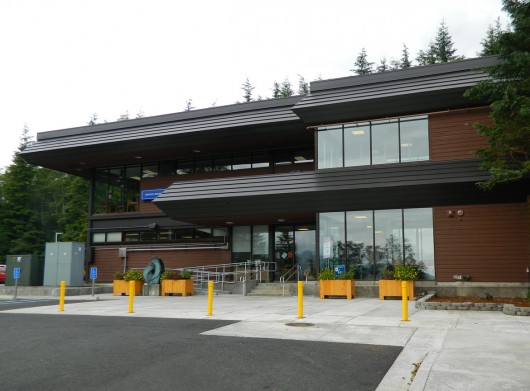Priscilla Schulte announced her new position as Director of the University of Alaska Southeast Ketchikan campus during last week’s Greater Ketchikan Chamber of Commerce lunch meeting.
Schulte, who had been interim director for the campus multiple times before, is an anthropology professor at the school. She explained that, as the search for a new director seemed to yield no results, the university asked her to hold the position permanently. Schulte said she is glad to use the position to pursue plans and improvements that she’s always wanted for the campus.
The UAS campus in Ketchikan started as the Ketchikan Community College in 1954, making it the oldest campus in Southeast Alaska. In 1987, it was restructured as part of a regional university.
These days, the campus offers “blended learning” – a combination of a traditional classroom setting and distance learning programs. Distance learning, also called “e-learning,” is one of the major advantages at the campus, and one that Schulte hopes to continue.
Schulte said she was initially hesitant to embrace e-learning. But as times changed, so did her opinion.
“I had 30 students in a class, and I was standing there in front of 30 students interacting every day,” she said. “It was fun. All of a sudden, I’m looking – when we get the years of the Pulp Mill closing – and I had very few students. Some of us were wondering what to do, and we got a little pressure to do this ‘distance teaching’. I wasn’t too excited, but I thought, ‘you know, I better do it…’ But now, I love it.”
E-learning generates 45% of credit hours at the university. Schulte and Dr. Bill Urquhart, professor of sociology at the campus, provided many reasons why e-learning is so effective for UAS.
As Schulte mentioned, when classes grow smaller, e-learning helps bolster the numbers, so UAS doesn’t have to cut courses. Rural communities also have easier access to education if campuses such as UAS offer e-learning courses. And ultimately, e-learning gives students more flexibility.
She adds that the school will work to introduce programs, such as a new Bachelor of Arts in Social Sciences. That degree – the first of its kind in the state – will be offered through e-learning. It awaits an economics professor who is going through the interview process.
Schulte is also excited to offer the “Multi-skilled Industrial Worker” program that she hopes someday may become an associate’s degree. That program will certify students in numerous basic industrial work skills.
In all, Schulte points to student satisfaction with the university.
“Some of the research that was done on UAS – and they did a McDowell study that came out last year – and in particular, they said that graduates report being highly satisfied with the quality of the faculty and instruction; the helpfulness of staff; the operations and advising. And overall, they have an outstanding, positive experience,” she said.
Schulte explains the flexibility UAS students enjoy.
“Over the years, I’ve seen students who may just come get a couple of class. They go get a job, but they have perhaps developed some better writing skills, communication skills, quantitative skills,” she said. “So it isn’t just, ‘come up, get a degree, and go off and get a job’. It’s often people dropping in, taking classes, moving ahead in their careers, changing careers, then coming back…”
Schulte stresses that UAS provides quality education for its students, with the majority of the faculty holding terminal degrees in their fields – such as Ph.D.s, or top certifications.






